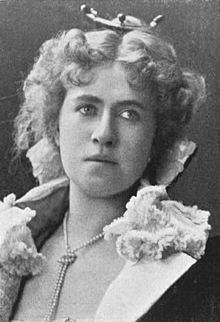Helene Fehdmer
Helene Fehdmer (born January 18, 1872 in Königsberg i. Pr. , † August 12, 1939 in Grainau , Upper Bavaria ) was a German actress.
Life
The daughter of the Königsberg painter George Fehdmer grew up in Berlin and Antwerp and originally wanted, like her four brothers, to work as a visual artist. She initially dealt with painting. Some wax sculptures created much later testify to her creative abilities.
Eventually Helene Fehdmer became interested in acting and took lessons in Cologne . After her debut as a stage actress in 1891 at the Kurtheater Wildbad, she came to Berlin the following year to continue her career at the Lessing Theater there. After a detour to the Berlin theater and engagements at the Residenztheater , where, apart from her work as a trilby, she was mainly used in Schwänken , she moved to Vienna in 1898 to fulfill an engagement at the theater in der Josefstadt . There she celebrated some successes with literary matinees.
After two years in Vienna and a guest tour to Russia , she returned to Berlin, appeared in French salon pieces at the Trianon Theater and, for the first time, in tragic roles at the New Theater . This was followed by commitments to the German Theater , again to the Lessing Theater, the theater in Königgrätzerstrasse and, since the First World War, also to the Volksbühne . Here you could see her in Berg Eyvind and his wife , Nach Damascus (after August Strindberg ) and Wallenstein's Death (after Friedrich Schiller ) at the side of her husband (since 1905), the actor Friedrich Kayßler . Since she left the Volksbühne (1923), Helene Fehdmer has mainly been touring in Germany and abroad. She then gave guest performances at Berlin's State Theater . Helene Fehdmer made her last appearance at the time of the 1936 Summer Olympics as Countess Bismarck in the play The Minister President by Wolfgang Goetz .
In the imperial capital, the East Prussian had made a name for herself as a character interpreter. Her best-known roles include the wife John in Gerhart Hauptmann's Die Ratten , Laura in Hermann Sudermann's The Butterfly Battle , the king's daughter Goneril in William Shakespeare's King Lear , Lyubow Andrejewna in Anton Chekhov's Der Kirschgarten and Klara Sang in Über Our Kraft . She celebrated one of her last great successes in early 1931 in Der Blaue Boll , a drama by Ernst Barlach .
Her excursions in front of the camera at the beginning of the sound film age remained largely meaningless. Her stepson was the actor Christian Kayßler . Her husband wrote the book Helene Fehdmer zum Gedächtnis in memory of his wife, who had died three years earlier , which was published in 1942 by Rütten & Loenig Verlag in Potsdam .
Filmography
- 1930: There is a woman who never forgets you
- 1931: Luise, Queen of Prussia
- 1932: One of us
- 1932: The child's first right
- 1933: The one from the Lower Rhine
- 1934: The Eternal Dream
- 1935: Frisian distress
- 1937: The ruler
- 1938: ballad
literature
- Hans Knudsen : Fehdmer, Helene, married Kayssler. In: New German Biography (NDB). Volume 5, Duncker & Humblot, Berlin 1961, ISBN 3-428-00186-9 , p. 46 ( digitized version ).
- Ludwig Eisenberg's Large Biographical Lexicon of the Stage , Leipzig 1903. p. 249.
- Johann Caspar Glenzdorf: Glenzdorf's international film lexicon. Biographical manual for the entire film industry. Volume 1: A-Heck. Prominent-Filmverlag, Bad Münder 1960, DNB 451560736 , p. 389.
- Wilhelm Kosch: German Theater Lexicon . Second volume, Klagenfurt and Vienna 1960, p. 973. (Entry by Helene Kayßler)
Web links
- Helene Fehdmer in the Internet Movie Database (English)
Individual evidence
- ↑ Season Chronicle 1920 to 1930 ( Memento of the original from August 14, 2012 in the Internet Archive ) Info: The archive link was inserted automatically and not yet checked. Please check the original and archive link according to the instructions and then remove this notice.
- ↑ Biography at Christian-Morgenstern.de
| personal data | |
|---|---|
| SURNAME | Fehdmer, Helene |
| BRIEF DESCRIPTION | German actress |
| DATE OF BIRTH | January 18, 1872 |
| PLACE OF BIRTH | Koenigsberg i. Pr. |
| DATE OF DEATH | August 12, 1939 |
| Place of death | Grainau , Upper Bavaria |

